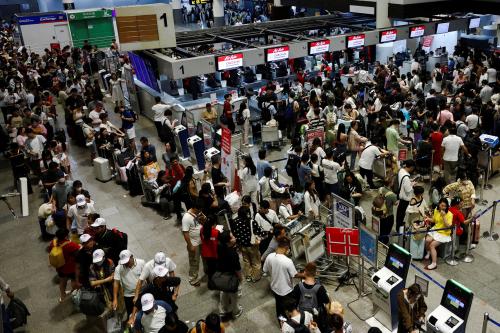This week, the United Nations is convening a new World Summit on the Information Society (WSIS) Forum in Geneva, Switzerland. The WSIS Forum builds upon U.N. General Assembly Resolution 70/125, an overall review of the implementation of previous WSIS outcomes. This resolution recognized the necessity of holding the forum on an annual basis and called for a close alignment between WSIS and the U.N.’s Sustainable Development Goals (SDG).
A quick review of SDG focus areas underscores the role that information and communications technology (ICT) plays in advancing U.N. objectives for the year 2030. For example, rural development, education, sustainable cities, transportation, health care, and gender equality will all be enhanced through better and more widespread ICT capabilities.
The United States promises to lead the global community in bringing the potential of ICT to the entire world. In a period when our domestic political debate seems to criticize U.S. leadership for ineffectively projecting power on the international stage, the WSIS forum may become a real-time case study to test the accuracy of that perception.
Significantly, the WSIS Forum now under way is chaired by Ambassador Daniel Sepulveda, deputy assistant secretary of state and U.S. coordinator for international communications and information policy. More than symbolic, this position is viewed as the convening leader, with substantial input in shaping both its agenda and potential outcomes.
Sepulveda notes the success that may follow will be the product of careful advance planning: “We had to construct language that we could all support, bridging different philosophies of governance and economics, as well as differing experiences in how people from various nations were reaping the benefits of the digital age or not, over the last ten years. Non-governmental stakeholders were vital [participants]. We benefited from their inputs and expertise through written contributions to the process, as well as their hard work deploying and developing information and communications technologies over the last decade.”
Instead of a series of high level statements delivered without exchange, which often is the mode for U.N. conferences, Sepulveda has expressed the hope that this year’s forum will be more dynamic, interactive, and inclusive. A critical aspect of this goal will be how well the U.S. can manage a complex process in a short amount of time, and then maintain post-Forum momentum for any initiatives that develop. In addition to various U.N. agencies that are involved (e.g., the International Telecommunication Union and the United Nations Development Program), it will be important to engage various outside interests such as the World Intellectual Property Organization and the International Labor Organization.
These groups, dubbed WSIS Action Line Co-facilitators, are important for coordinating multi-stakeholder implementation activities, information exchange, forming new ideas, and sharing best practices. They can also assist in developing multi-stakeholder and public-private partnerships to advance ICT development goals over time.
In the long run, the success of the WSIS Forum may well be judged by a standard that Sepulveda has articulated: “Government and the UN system are only part of the team of actors and stakeholders critical to the construction of a global information society. We as governments should ask and aim to support the efforts of industry, civil society, academia, and technologists in fulfilling their missions and goals for themselves and others. We must stay true to our focus on implementing the action lines assigned to the various U.N. bodies to facilitate and remember our call to service.”
More immediately, this standard also may be useful to evaluate our nation’s considerable leadership skills on the world stage.


Commentary
Asserting American leadership in shaping the global information society
May 6, 2016